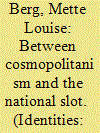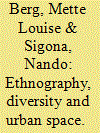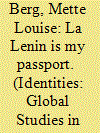| Srl | Item |
| 1 |
ID:
087516


|
|
|
|
|
| Publication |
2009.
|
| Summary/Abstract |
Although cosmopolitanism used to be associated with Western, elite practices, it has in recent years been used to describe a wider array of practices by non-elite and non-Western groups. This article explores the cosmopolitanism of Cuba's "children of the revolution" living in Spain. They are those now young adults who were born in Cuba after the revolution and who were brought up to become the socialist New Man. Theirs was a world of socialist cosmopolitanism, which simultaneously was infused with commitment to a national, territorially-based political project: an independent, socialist Cuba. However, some of these New Men and New Women now embrace ideals of cosmopolitan individualism rather than the patriotic socialism with which they were inculcated as children. Yet the cultural tools that the children of the revolution make use of in their practices and narratives of cosmopolitanism paradoxically point back to revolutionary Cuba. The article argues that cosmopolitanism as a lived practice owes to experiences within the Cuban socialist-national project and is in effect a response to the ineffectiveness of this project, not necessarily a substantive opposition to it. Social capital and habitus deriving from Cuban socialism gave the children of the revolution the desire to attain cosmopolitanism as part of their life-projects. This finding suggests that the relationship between nationalism and cosmopolitanism needs further rethinking.
|
|
|
|
|
|
|
|
|
|
|
|
|
|
|
|
| 2 |
ID:
123185


|
|
|
|
|
| Publication |
2013.
|
| Summary/Abstract |
This article is an introduction to a special issue on ethnography, diversity and urban space. It places the 'diversity turn' within studies of migration and multiculture historically and discusses the implications of concepts such as 'diversity' and more recently 'super-diversity' for scholarship, policy and identity politics. It argues that diversity is a helpful concept for studies of migration and multiculture because it avoids the essentialism and bias towards ethnic affiliation often characterising studies within the multiculturalism framework, while being more grounded locally than studies within the transnationalism framework. It examines the methodological implications of increasing diversity and complexity on ethnographic studies and the definition of the 'field'. It makes the point that increasing urban diversity poses a challenge to ethnographic ideals of 'immersion' and wholeness. Finally, it introduces the individual articles in the special issue.
|
|
|
|
|
|
|
|
|
|
|
|
|
|
|
|
| 3 |
ID:
137925


|
|
|
|
|
| Summary/Abstract |
Based on an ethnographic study of transnational networks of alumni of an academically selective boarding school in Havana, this article explores the nexus between mobility, schooling and belonging in the context of socialist Cuba and its diaspora. Drawing on Goffman’s work, I argue that the boarding school experience was transformative; it facilitated or consolidated social mobility for its pupils, which later, for many, led to geographic mobility in the form of study and work outside Cuba. After graduating, alumni continue to identify with the school and to reproduce their alumni identities. The affective webs of belonging forged through family links and friendships fostered at the school constitute emotionally sustaining networks that also provide material support after migrating. I propose that the school represents a site of identification for a globally dispersed non-national diaspora and argue that migration scholars need to embed international migration within people’s lives more broadly.
|
|
|
|
|
|
|
|
|
|
|
|
|
|
|
|